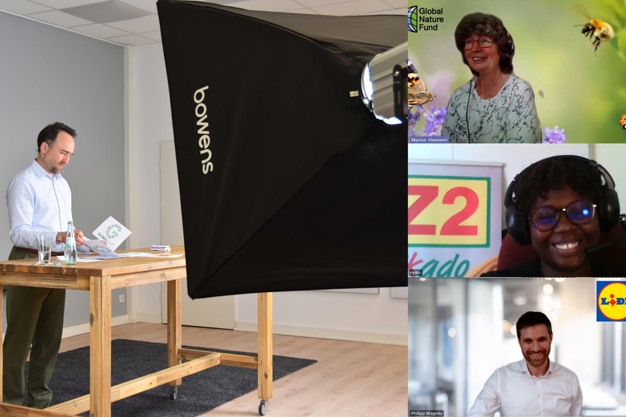To celebrate the International Day of Biodiversity, GLOBALG.A.P. organised an online panel discussion entitled "Be Part of the Plan: How can responsible and resilient agricultural practices promote and protect biodiversity?". The panellists were Marion Hammerl, President of the Global Nature Fund (a non-governmental organisation), Philipp Wagnitz, Head of Quality and Sustainability at retailer Lidl International, and Nyiko Mutileni, Environmental Scientist at ZZ2, a South African producer. Rene Capote, Senior Technical Expert at GLOBALG.A.P., took part in the discussion as moderator.

One of the main topics of the panel discussion was the Biodiversity Plan and the global biodiversity targets for 2050, which were adopted by the UN in 2022. Rene Capote gave all panellists the opportunity to describe their views on the biodiversity plan. "The targets should be formulated in such a way that they are transferable to the reality of business," said Philipp Wagnitz from the perspective of a retailer. "We still have a long way to go, and I think that science-based targets for nature are a very good starting point. How do we translate that into a long-term strategy from a business perspective? How is this possible, and how can we measure it? Because the topic of biodiversity is sometimes not yet tangible enough in this respect."
Land for the preservation of nature
Nyiko Mutileni used her time to emphasise that, as producers, they see themselves as preservers of land. "Of the land we own, 35 per cent is used for agricultural purposes and 65 per cent for nature conservation. We are aware that the restoration measures require a lot of investment. I believe that everyone should be involved. They should invest, and we should invest to help farmers restore."
"Unfortunately, not all farmers have all the means to say that," Wagnitz emphasised in this context. "If you look at the situation in Europe, the picture is different to South Africa. For example, we hear from farms in Spain, some of which produce in greenhouses, that it is difficult to designate areas for biodiversity there. We need to find solutions for this. How can we deal with this? Can we protect these areas outside the greenhouses?"
"Whenever it comes to not using part of the land and leaving it to nature, it's a very delicate and difficult discussion. If you tell a 100-hectare farm that it should only produce on 90 hectares in the long term, the question is of course: 'What do I do with this loss of production? How do we find ways to translate that into a business approach that works in the long term?"
"So there are legitimate questions about biodiversity that we haven't fully thought through yet. You will always find ways to contribute to the plan, but scaling it up to leave more room for nature in our current agricultural system is a very difficult endeavour that we need to tackle. And we need to take it one step at a time."
'Biodiversity is not a political priority'
"We would like to see the food sector support agriculture in this regard to encourage investment," said Marion Hammerl in her speech from the perspective of an NGO. "So far, agriculture is still seen more as an obstacle and less as a good investment. We are also working to put pressure on policymakers. In Europe, we have started to support our biodiversity strategy with some legislation and this needs to be implemented well. If we could turn harmful subsidies into positive subsidies, that would be a very important step."
Wagnitz elaborated on this point. "I think we need to work more towards quantifying things, more towards a common objective in the EU, also on the retail side. We need to move away from pilot projects and towards scaling up approaches with clever business concepts behind them. And we need to create political incentives, which, as Marion said, are really lacking. Because only through a level playing field can we also make a major contribution to preserving biodiversity."
GLOBALG.A.P. and biodiversity
At the end of the panel discussion, Capote referred to "two highlights: One is the development of the Environmental Sustainability Solution. It will be open for online public consultation from 29 May to 5 July. The second is the GLOBALG.A.P. Summit. It will take place in Poland from 10 to 12 September and is a crucial moment for discussions, for important networking and for continuing to tackle these common opportunities together."
For more information:
www.globalgap.de
